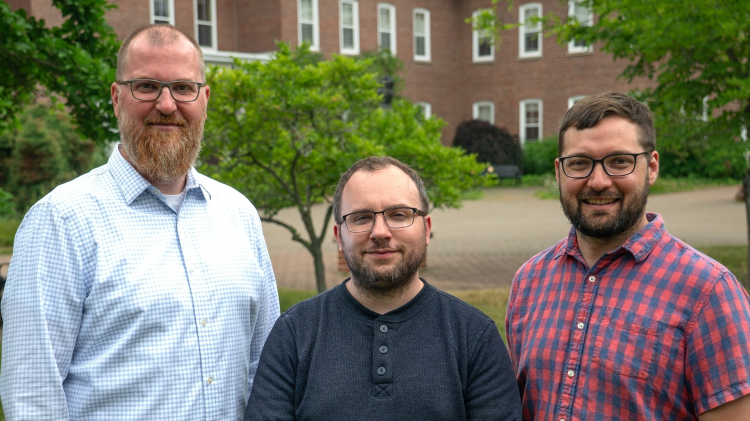Six St. Francis Xavier University faculty members have been awarded nearly $1 million in federal funding from the Natural Sciences and Engineering Research Council of Canada (NSERC). The funding will support research projects that range from understanding how the mind processes information for decision and action; to carbon exchange; to how the body deals with the threats posed by thermal stress.

Pictured, l-r, are Dr. Ralph Redden, Dr. Darien DeWolf, and Dr. Kyran Cupido. Absent are Dr. Dan Kane, Dr. Graham Clark, and Dr. Cory Bishop
Dr. Cory Bishop, Dr. Graham Clark, Dr. Kyran Cupido, Dr. Darien DeWolf, and Dr. Ralph Redden are all successful recipients of an NSERC Discovery Grant. Drs. Clark, Cupido, DeWolf, and Redden also received the one-time $12,500 Early Career Researcher (ECR) Discovery Launch supplement. Dr. Dan Kane was awarded an NSERC Discovery Development Grant.
The funding was part of a series of major investments announced July 9, 2025, by the Honourable Mélanie Joly, Minister of Industry and Minister responsible for Canada Economic Development for Quebec Regions. The awards span a diverse spectrum of natural sciences and engineering disciplines and are empowering Canadian researchers to lead in critical fields for the benefit of all Canadians.
Details of each StFX research project follows:
NSERC Discovery Grant:
Dr. Graham Clark, Earth and Environmental Sciences, "Carbon Exchange and Storage Quality of Atlantic Canada Wetland Restoration," $39,000/year for five years. Dr. Clark's research program focuses on the interconnectivity of the carbon cycle across landscapes. "I quantify vertical greenhouse gas (GHG) fluxes while also examining lateral hydrochemical processes that impact carbon dynamics," he says. "A key objective of my work is to provide stakeholders with evidence-based guidance on how land-use practices and restoration activities can be leveraged to mitigate GHG emissions. My recent NSERC Discovery Grant was awarded to support this research on soft-sediment coastal ecosystems in Maritime Canada."
Dr. Kyran Cupido, Math and Stats, "Spatial Modeling in Actuarial Science," $35,000/year for five years. Dr. Cupido's research focuses on the actuarial topic of modelling longevity risk, which is the risk that a population experiences higher survivorship than was expected at the time when mortality linked financial commitments were made (think 'outliving one's pension'.) "I have been using spatial models, which are popular in geographic research, to update the traditional modelling approaches that are commonly used by practicing actuaries. As such, the overall objective of my research program is to advance the ways in which spatial considerations are introduced into actuarial studies of longevity risk," Dr. Cupido says. "I intend to find a balance between working on new problems arising within the world of actuarial science, while additionally updating classical actuarial models to incorporate a spatial perspective."
Dr. Darien DeWolf, Math and Stats, "Models of Partiality in Geometry and Topology," $35,000/year for five years. Dr. DeWolf's research program aims to model partiality categorically in order to investigate the relationships between partial structures in geometry and topology. The key focus areas include examining the interplay between inverse categories, Ehresmann sites, and étale groupoids; exploring restriction bicategories and their connections to structures like restriction modules; and defining a notion of local homotopy using fundamental inverse categories. "By studying the connections between restriction structures across geometry and topology, this work seeks to provide a theoretical foundation for generalizing global structures to partial structures, contributing to the unification of theories of partiality in these fields," Dr. DeWolf says.
Dr. Ralph Redden, Psychology, "On the Understanding of Attention in the Lab and the Real World," $33,000/year for five years. Dr. Redden's research focuses on understanding how the mind processes information for decision and action. More specifically, he has aimed to disentangle the sometimes competing, sometimes complementary forces that act on our attention systems: such as the reflexive, automatic responses to our surroundings that arise from more primitive areas of the brain, and the volitional, intentional choices we make based on our goals and conscious experience that involve some of the more uniquely human brain structures. "Importantly, this program of work will take a multimodal approach (using computer tasks, virtual- and augmented-reality, eye tracking and neuroimaging) to connect the vast knowledge we have of the mind and brain that has been crafted in carefully controlled lab-based experiments with the dynamic nature of the real world in which we live."
Dr. Cory Bishop, Biology, "Ecology and Evolution of a Symbiosis between Unicellular Green Algae and Amphibian Egg Masses," $26,759/year for five years. Symbioses occur when two or more species interact intimately in a sustained manner, often for mutual benefit. Though historically underappreciated, symbioses create new life forms, maintain biodiversity and are critical for agriculture. This research studies a nutrient exchange mutualism between unicellular green algae in the Oophila clade and egg masses of six amphibian species distributed in North America, Europe and Japan. In all cases, algae are ectosymbiotic: they are transmitted from breeding habitat and populate individual egg capsules in egg masses, in contact with developing embryos, but outside their bodies. In egg masses of the salamander Ambystoma maculatum algae increase host fitness by producing O2 in the light and embryos provide algae with CO2 and fixed nitrogen. However, the mutualism with A. maculatum (our focal host species) is special because an endosymbiotic arrangement has also evolved. This research investigates the origin and function of the mutualism between O. amblystomatis and A. maculatum and is poised to make multiple novel contributions to understanding algal-amphibian mutualisms and mutualisms in general.
NSERC Discover Development Grant
Dr. Dan Kane, Human Kinetics, "Metabolic control in thermal budgets of integrated organisms," $22,000/year for two years. Dr. Kane says this research will explore how lactate and potentially other key metabolites shared among cells contribute to the regulation of body heat. "By examining how these metabolic pathways influence heat production from cells to whole organisms, the study aims to shed light on how the body deals with the threats posed by thermal stress, with potential applications in health care, human performance, and agriculture."












